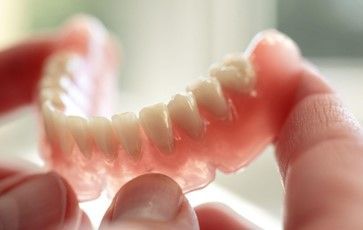


Dealing with missing teeth can be frustrating and uncomfortable. Whether caused by aging, injury, or tooth decay, losing teeth can affect your ability to speak, chew, and smile with confidence. If you're noticing issues with your teeth or oral health, it may be time to consider dentures. Dentures are personalized dental devices created to replace lost teeth and enhance both the functionality and appearance of your smile. In this article, we’ll cover common signs that may indicate you need dentures or partials.
1. Difficulty Chewing Food
One of the first signs that dentures may be necessary is trouble chewing. If you've noticed that it’s increasingly difficult to eat certain foods, like apples, steak, or other harder textures, it could be a sign that your teeth are no longer able to provide the necessary support. Missing or damaged teeth can impair your chewing ability, leading to discomfort when eating. If this sounds familiar, dentures or partials can help restore your ability to enjoy a wide variety of foods.
2. Frequent Tooth Pain or Sensitivity
If you experience frequent pain, sensitivity, or discomfort in your mouth, it could indicate that your teeth are no longer in good condition. This discomfort may come from cracked or decayed teeth that are beyond repair. In some cases, a dentist may recommend dentures as a solution, especially if several teeth are severely damaged or missing. Dentures can eliminate pain while restoring your ability to speak and eat with ease.
3. Loose or Shifting Teeth
Loose or shifting teeth are clear indicators that your dental health needs attention. As teeth loosen, they become more susceptible to falling out or causing alignment problems. Over time, the gaps left by missing teeth can cause other teeth to shift, creating additional problems. Partials or full dentures can help stabilize your smile, prevent further shifting, and restore proper function to your mouth.
4. Self-Conscious About Your Smile
Your smile is often one of the first things people notice, and when you have missing or damaged teeth, it can affect your confidence. If you’re constantly self-conscious about the appearance of your smile or feel embarrassed to speak or laugh in public, dentures may be a solution. They provide a natural-looking replacement for missing teeth, giving you the confidence to smile freely again.
5. Difficulty Speaking Clearly
Missing teeth, especially in the front of the mouth, can make it difficult to speak clearly. If you’ve noticed a slurring of words, difficulty pronouncing certain sounds, or a lisp due to gaps in your teeth, dentures can help. They restore the structure of your mouth and allow you to speak with clarity and confidence once again.
6. Gum Disease or Tooth Decay
If you’re dealing with severe gum disease or tooth decay, your natural teeth may not be salvageable. In these cases, your dentist may recommend dentures as an alternative to extractions or painful treatments. When your remaining teeth are severely compromised, dentures can provide a comfortable and functional replacement that protects your oral health.
7. Trouble with Denture Fit or Poor-Fitting Bridges
If you currently have partials or dentures but experience discomfort, difficulty with fitting, or issues with the appliances staying in place, it may be time to update or replace them. Over time, your mouth changes, and your dentures may no longer fit as well as they once did. A new set of dentures or partials, custom-fitted to your mouth, can eliminate discomfort and restore optimal function.
8. Teeth Grinding or Clenching
Teeth grinding or clenching, known as bruxism, can lead to excessive wear and tear on your teeth. Over time, this can cause tooth loss or severe damage that may make dentures necessary. If you’ve noticed that your teeth are shorter, more worn down, or that you grind or clench your teeth regularly, dentures can help restore the natural look of your smile while protecting your gums and jaw.
9. Unsuccessful Attempts to Repair Damaged Teeth
If you’ve tried several dental treatments, such as fillings, crowns, or root canals, without success, dentures may be the next step. When teeth are beyond repair, dentures can be a practical solution to replace lost or severely damaged teeth, restoring both the appearance and function of your smile.
10. Advice from Your Dentist
Ultimately, the best way to know if you need dentures is by consulting with your dentist. A dental professional can evaluate your oral health, discuss your symptoms, and recommend the best treatment option, whether it be dentures, partials, or another solution.
If you're experiencing any of the signs mentioned above and are considering dentures or partials, turn to Advanced Dental Care. Serving the entire Port Orange area, we specialize in providing high-quality dentures and partials designed for comfort, function, and aesthetics. Call us at
386-322-7786 to schedule a consultation today, and let us help you restore your smile and confidence!












